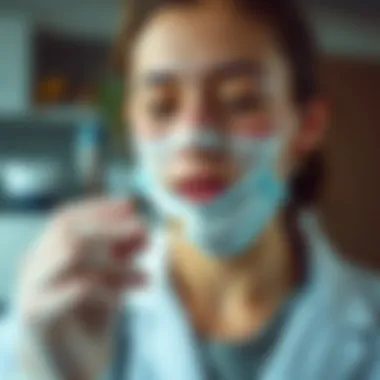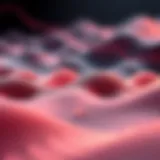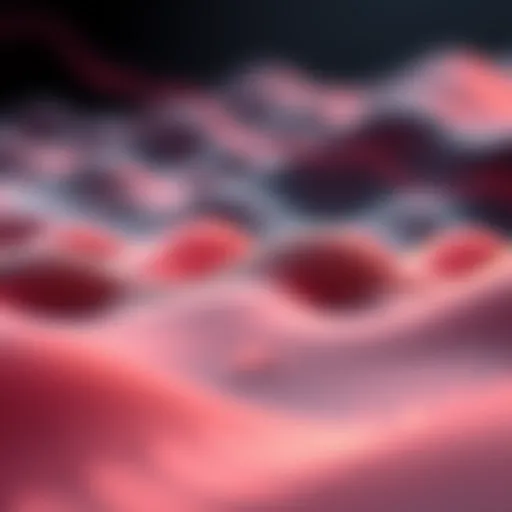Effective Remedies for Herpes Cold Sores


Intro
Herpes cold sores, often appearing as unsightly blisters on the lips or around the mouth, can be quite a nuisance. Caused by the herpes simplex virus type 1 (HSV-1), these sores can bring discomfort not only physically but also emotionally. It's not just a matter of appearance; the reoccurrence of these sores can significantly affect one's quality of life. A comprehensive understanding of herpes cold sores—how they manifest, when they strike, and what can be done about them—is essential for anyone seeking effective relief.
Understanding the underlying mechanics of the herpes simplex virus is crucial. This virus is stealthy, often laying dormant in the body and reemerging during times of stress, illness, or even exposure to sunlight. Such triggers can be unpredictable, leaving those affected feeling vulnerable and anxious about outbreaks. Therefore, exploring remedies for these pesky cold sores goes beyond mere treatment; it beckons one to delve into prevention strategies and lifestyle adjustments as well.
Given the importance of managing these symptoms, this article aims to offer clarity around effective remedies and therapeutic approaches. By highlighting scientific research, anecdotal evidence, and practical lifestyle tips, readers can equip themselves with the knowledge needed to tackle herpes cold sores head-on. Right from antiviral medications to some lesser-known home remedies, we will navigate various avenues designed to alleviate the discomfort that comes with a flare-up.
In the sections that follow, we will break down the findings from recent studies, discuss the implications of these discoveries, and provide guidance on an integrative approach for management. Understanding these aspects may empower individuals in their quest for reducing the frequency and severity of outbreaks, helping them regain control over their lives.
Understanding the Herpes Simplex Virus
Understanding the herpes simplex virus is crucial for comprehending how herpes cold sores develop and how to manage them effectively. This knowledge serves not only to demystify the virus but also to empower individuals to make informed decisions about their health. When you grasp the basics, such as the virus's transmission methods and the typical progression of symptoms, it can significantly reduce anxiety associated with outbreaks.
Being familiar with herpes simplex helps in recognizing the symptoms early, which can lead to quicker treatment and shorter healing times. It also brings to light important considerations regarding social interactions and personal hygiene, aspects that frequently cause concern for those affected. Given that this virus has various classifications, knowing which type you may be dealing with gives more insight into treatment options.
Classification of Herpes Simplex Virus
Herpes simplex virus, abbreviated as HSV, falls into two primary categories: HSV-1 and HSV-2. Each type has its specific characteristics, though both can lead to oral or genital infections.
- HSV-1 is most commonly associated with oral herpes, which often manifests as cold sores around the mouth, though it can occasionally cause genital herpes through oral-genital contact.
- HSV-2, on the other hand, primarily leads to genital herpes. It tends to be the culprit behind outbreaks in the genital region, making it a significant health concern.
It’s also worth noting that once an individual contracts HSV, whether it is HSV-1 or HSV-2, the virus establishes latency in the body. This means that it can remain inactive for long periods, often hidden from the immune system, only to reactivate later due to triggers like stress or illness.
Transmission and Onset of Symptoms
Transmission of herpes simplex is typically via direct contact with an infected person. This can happen through kissing someone with an active cold sore or engaging in sexual activity with someone who carries HSV-2. The virus is particularly contagious when cold sores are present but can also be spread when no visible symptoms are apparent.
Once the virus enters the body, it can take several days for symptoms to show up. Initial signs often include tingling or itching around the area where the sores will form. These symptoms can be quite subtle, which sometimes leads to a delay in seeking treatment.
Outbreaks can recur, sometimes triggered by factors like stress, fatigue, or even changes in the weather. These recurrences can be brief, but understanding the typical timeline and symptoms associated with an outbreak helps individuals prepare and respond effectively.
"Knowledge is power; understanding your body is the first step towards managing your health."
In summary, diving into the classification and transmission elements of the herpes simplex virus can greatly aid those affected by herpes cold sores. This foundation sets the stage for exploring various treatment options and lifestyle choices that can alleviate the impact of outbreaks.
Symptoms of Herpes Cold Sores
Understanding the symptoms of herpes cold sores is pivotal for individuals looking to manage outbreaks effectively. Symptoms serve as the initial indicators that the herpes simplex virus may be rearing its head, allowing for prompt intervention and better overall management. The more one knows about these signs, the better one can prepare and respond. This section elucidates the key aspects related to manifestations of herpes cold sores, drawing attention to the importance of recognizing them early and navigating the stages of an outbreak as well as understanding recurrence.
Initial Signs and Stages of Outbreak
The onset of a cold sore can often sneak up on someone. Initial signs typically manifest a few days before the actual blister appears. You'll find that many people report sensations like tingling, itching, or a burning feeling around the lips or in the area where the sore will erupt. These are crucial cues. They indicate that the virus is becoming active, and recognizing them can help one take preventive steps.
Stages of Outbreak
- Prodromal Stage: This is where the early symptoms lurk. When you feel that itch or burn, it's like a warning light illuminating the dashboard. Acting quickly can sometimes shorten the duration and severity of the outbreak.
- Blister Formation: After a day or two, blisters start to develop. They can be quite painful and are filled with fluid. It is vital to avoid any direct contact during this stage—this will help prevent spreading the virus.
- Crusting Over: Eventually, these blisters will burst and form a crust, signaling that the outbreak is moving to recovery. During this phase, one needs to be cautious, as the sores can still be contagious.
- Healing Phase: Finally, the crusts fall off, and the skin heals, although the area may remain sensitive for a time.
This journey from itch to healing can be tough, but knowledge is power. Be cognizant of changes in your body; understanding these stages can allow an individual to seek appropriate treatment sooner.
Duration and Recurrence of Cold Sores
Cold sores have a reputation for recurring, much to the dismay of those affected. Typically, these sores last about 7 to 10 days if left untreated; however, the duration can vary based on personal health factors and interventions taken.
Average Duration
- Day 1: Tingling and itching will occur.
- Days 2-3: Blisters start forming and may be at their most painful.
- Days 4-6: Blisters burst and crust over, with the pain often subsiding as healing begins.
- Days 7-10: Scabs fall off, and the skin begins to recover.
Understanding the typical duration of cold sore outbreaks can help in planning life around potential disruptions, such as work or social events.
Recurrence Factors
The fear of recurrence is real for many. Factors that may trigger a new outbreak include but are not limited to:
- Stress
- Fatigue
- Illness or fever
- Hormonal changes, like menstruation
- Sun exposure or skin trauma


Being aware of these triggers can empower individuals to take preemptive measures to lower the chances of another outbreak. While cold sores might be a burdensome aspect of living with the herpes virus, informed strategies and timely actions can make all the difference in managing the symptoms effectively.
Conventional Treatment Options
When grappling with herpes cold sores, many individuals typically seek solutions that can speed up healing and minimize discomfort. Conventional treatment options serve as the cornerstone of managing outbreaks, providing a structured approach that enhances recovery times and alleviates symptoms.
Antiviral Medications
Antiviral medications are a mainstay in the treatment of herpes cold sores. These drugs work by inhibiting the replication of the herpes simplex virus, essentially putting a damper on its ability to spread and cause further lesions.
Types of Antivirals
One of the most recognized antiviral medications is Acyclovir. This drug is celebrated for its effectiveness in reducing the duration and severity of outbreaks. Another notable mention is Valacyclovir, which is often chosen for its convenience of dosing.
The key characteristic of these antivirals lies in their targeted action. They hinder viral replication at the cellular level. For patients, this means reduced symptom severity and shorter healing times, making them a beneficial choice to explore.
However, while effective, these treatments may not be suited for everyone. Some individuals might experience resistance to these medications, which diminishes their efficacy over time.
Dosage Recommendations
Often, the prescribed dosages of these antiviral medications vary based solely on individual needs and the stage of the outbreak. Typically, a doctor may recommend Acyclovir taken five times daily for a specific duration during an initial outbreak, while Valacyclovir may be taken less frequently, usually twice a day.
The uniqueness of these dosage recommendations hinges upon addressing the virus's activity effectively. Timeliness and adherence to the regimen can significantly impact the outcome. Nonetheless, overuse or mismanagement of dosages might lead to unwanted side effects or resistance.
Potential Side Effects
Like any medication, antiviral treatments come with potential side effects. Common reactions might include nausea, diarrhea, or more severe allergic reactions in rare cases.
Understanding these side effects is crucial since it informs patients of what to expect, arming them with knowledge to better manage their treatment. On the flip side, some may find this information discouraging, which could lead to non-compliance in their treatment regimen.
Topical Treatments
Topical treatments can act as another layer of defense against herpes cold sores. They are designed to be applied directly onto the affected skin, providing symptomatic relief and aiding the healing process.
Creams and Ointments
Among the topical treatments available, creams such as Docosanol stand out for their ability to reduce healing time. These formulations are straightforward to use and can provide relief from discomfort. What makes these products appealing is their non-prescriptive availability, allowing individuals to seek treatment without a doctor's visit.
The unique feature of these creams is their mechanism of action, which involves preventing the virus from entering healthy cells, ultimately curtailing the spread. Despite their advantages, some individuals may find lesser efficacy, particularly during more severe outbreaks.
Effects on Healing Time
When assessing the effects of topical treatments on healing time, studies indicate that they can indeed hasten recovery. Patients typically report notable differences in how quickly the cold sore resolves when using topical agents.
The key characteristic here is the combination of direct application and symptomatic relief. This localized approach means that individuals experience fewer discomfort symptoms while their body works to eliminate the virus. Yet, it’s important to remember that while they assist in healing, they are often not a standalone solution for larger outbreaks.
"The management of herpes cold sores is highly individualistic, with options varying widely based on personal needs, responses to treatment, and lifestyle choices."
In summary, exploring conventional treatment options for herpes cold sores reveals a variety of tools designed to tackle this recurrent ailment. Antiviral medications are essential in reducing the impact of outbreaks, while topical treatments offer complementary relief. Each approach has its advantages and nuances, contributing to a comprehensive response to herpes cold sore management.
Alternative and Natural Remedies
Alternative and natural remedies present an essential avenue in the management of herpes cold sores. These options often stem from the desire to minimize reliance on pharmaceuticals, seek holistic approaches, and avoid potential side effects that come with conventional treatments. The significance lies not only in their potential efficacy but also in their accessibility and alignment with individual lifestyle choices.
Natural remedies can provide relief and assist in managing symptoms without the strings that often come attached to over-the-counter medications. With rising interest in herbal treatments and dietary influences, understanding these alternatives can empower individuals to take charge of their health in a more personalized way.
Herbal Treatments
Lemon Balm
Lemon balm, known scientifically as Melissa officinalis, holds a noteworthy spot in the herbal world, particularly regarding its potential against cold sores. This fragrant herb has been traditionally utilized for its calming effects, but its antiviral properties may specifically target the herpes simplex virus. The key aspect that distinguishes lemon balm from other remedies is its high concentration of rosmarinic acid, which may help inhibit viral replication.
People often prefer lemon balm for its gentle application; it can be used directly in a tea or oil and applied topically in cream form.
Some benefits of lemon balm include:


- Antiviral Effects: Studies suggest it can shorten healing time and reduce pain associated with outbreaks.
- Ease of Use: From teas to ointments, there's a method suitable for everyone.
- Accessibility: This herb is readily available at health stores and online.
However, potential disadvantages do exist, such as possible allergic reactions in a small number of individuals, so it’s always wise to perform a patch test before full application.
Aloe Vera
Aloe vera is another popular natural remedy for cold sores, famous for its soothing, hydrating properties. The gel harvested from its leaves contains compounds like acemannan that not only hydrate the skin but may also provide antiviral effects. Its reputation in skincare is well-earned, often praised for speeding up wound healing and reducing inflammation.
What makes aloe vera stand out is:
- Versatile Application: It can be applied topically directly from the plant or utilized in various skin care products.
- Cooling Sensation: Offers immediate relief from burning and itching sensations associated with outbreaks.
- Nutritional Benefit: Beyond its topical use, aloe vera can also be ingested in juice form for internal benefits.
On the flip side, individuals should be cautious about using products with additives or preservatives that can dilute its efficacy. Pure aloe vera gel is the recommended form to utilize.
Dietary Considerations
Diet plays an underlying role in managing herpes simplex virus symptoms and potentially reducing outbreaks. The foods we eat can either support or hinder our immune system, influencing how often and intensely outbreaks occur. Integrating the right foods can build resilience and foster health, making dietary considerations an integral part of managing herpes.
Foods to Include
Focusing on a diet rich in specific protective foods forms an important aspect of managing herpes cold sores. These foods can enhance overall immune function and help mitigate outbreaks. Notably, foods high in lysine, like fish, potatoes, and legumes, can counteract the effects of arginine, an amino acid that the herpes virus thrives on.
Key points about including beneficial foods:
- Immune Boosting: Foods rich in vitamins, especially vitamin C and zinc, are invaluable.
- Hydration: Staying hydrated supports skin health and wound healing.
- Plant-Based Options: Fruits and vegetables rich in antioxidants help combat oxidative stress, potentially reducing outbreak frequency.
That said, focusing on proper portion sizes and maintaining a balanced diet remains crucial so as not to swing the pendulum too far in any direction.
Foods to Avoid
Conversely, certain foods may dip into the realm of being detrimental when managing herpes cold sores. Foods high in arginine, such as chocolate, nuts, and certain grains, may encourage the virus to reactivate. Therefore, keeping these foods in moderation can be critical during flare-up periods.
Some important considerations here include:
- Dairy Products: Some individuals report increased outbreaks post-consumption; awareness of personal triggers is vital.
- Sugary Snacks: A diet high in sugar can compromise immune function, which is counterproductive.
- Processed Foods: Often lacking essential nutrients, these can inadvertently impact overall health.
Striking the right balance between inclusion and avoidance is key in crafting an effective dietary strategy to manage herpes cold sores.
Nurturing your immune system through dietary adjustments is not an overnight remedy but a worthwhile endeavor in the long run.
Preventive Measures
In managing herpes cold sores, preventive measures play a vital role, acting as the first line of defense against outbreaks. Cold sores, caused by the herpes simplex virus, can be frequent and uncomfortable, so understanding how to reduce the risk of outbreaks can greatly enhance one's quality of life. By focusing on hygiene practices and managing stress along with triggers, individuals can significantly mitigate the frequency and severity of attacks.
Hygiene Practices
Maintaining good hygiene is essential when it comes to minimizing the spread and intensity of herpes cold sores. Simple practices can go a long way in preventing outbreaks and protecting oneself from transmission. Here are some key hygiene practices to adopt:
- Handwashing: Regularly washing hands with soap and water, particularly after touching the face or an active sore, helps limit virus spread. If soap is unavailable, an alcohol-based hand sanitizer can serve as an alternative.
- Avoiding Close Contact: It is important to avoid kissing or sharing utensils and personal items, especially during an outbreak. The virus is highly contagious and can be easily transmitted through direct contact.
- Care with Personal Items: Items like lip balm, towels, and razors should not be shared. Keep separate items for personal use to avoid any potential viral transfer.
"A stitch in time saves nine."
Taking proactive steps in hygiene can prevent a small issue from escalating into a larger problem.
Managing Stress and Triggers
Stress is a well-known trigger for herpes outbreaks. Therefore, managing stress effectively can contribute significantly to the overall management of the condition. Recognizing individual triggers is the first step in stress management.
Some common lifestyle adjustments include:
- Mindfulness and Relaxation Techniques: Practices such as yoga, meditation, or deep-breathing exercises can help lower stress levels. Engaging in these activities regularly allows for better management of daily pressures.
- Balanced Lifestyle: Adequate sleep, a balanced diet, and regular exercise can strengthen the immune system, making the body less susceptible to outbreaks. Aim for 7-9 hours of quality sleep per night, and stay hydrated.
- Identifying Personal Triggers: Keeping a journal to note any changes in mood, diet, or environmental factors can help in pinpointing specific triggers that lead to outbreaks. Once identified, one can work to minimize exposure to these triggers.
Being proactive both in hygiene and in stress management equips individuals with powerful tools to combat herpes cold sores effectively. It takes intentional efforts, but the long-term benefits of reduced outbreaks and enhanced confidence are well worth it.
Impact of Lifestyle on Herpes Management
Managing herpes cold sores goes beyond medications and topicals; it involves a holistic approach that factors in lifestyle choices. Lifestyle can significantly influence the frequency and severity of outbreaks, making it crucial to understand its impact. Factors such as sleep, nutrition, and exercise can all contribute to how the herpes simplex virus behaves in the body.


Key elements to consider include:
- Daily habits that strengthen the immune system.
- The role of stress in triggering outbreaks.
- Keeping healthy routines that discourage the virus from rearing its ugly head.
Fostering a lifestyle that promotes well-being is a cornerstone of herpes management. Individuals equipped with knowledge about how their habits affect their health can make informed decisions that may curtail the interruptions caused by cold sores.
The Role of Sleep and Nutrition
Sleep and nutrition are two intertwined components of lifestyle that hold considerable sway over overall health and specifically the immune response. Poor sleep can quickly undermine the body's ability to fend off infections. When sleep is sparse, the immune system might be caught flat-footed, unable to prevent the herpes virus from showing up.
On the nutrition front, some foods can assist or hinder your body’s immune function.
- Foods to include:
- Citrus fruits like oranges and lemons provide Vitamin C, known for boosting immunity.
- Lean proteins, such as chicken and beans, help in tissue repair and immune response.
- Nuts are rich in Vitamin E, which is beneficial for healing skin.
In contrast, some foods can stimulate outbreaks or make symptoms worse. Highly processed foods or those laden with sugar can pose threats to immune health by triggering inflammation.
Exercise and Immune Function
Physical activity serves as a catalyst for maintaining a robust immune system. Regular exercise can be your ally in combating the herpes virus. It encourages better circulation, allowing immune cells to travel more efficiently throughout the body, improving overall immune surveillance.
Incorporating moderate exercise into your routine is key.
- Benefits of Exercise:
- Enhances mood through the release of endorphins, reducing stress—a known trigger for outbreaks.
- Promotes better sleep, enhancing recovery and immune function.
- Supports overall physical health and resilience, providing power to your immune response.
"You don’t have to run a marathon to see benefits; a simple walk can be transformative for both mind and body."
In summary, the integration of sleep, good nutrition, and exercise into daily life is not just a nice-to-have but a necessity for those managing herpes cold sores. Making conscious choices in these areas can lead to fewer outbreaks and a better quality of life.
The Psychological Aspect of Cold Sores
Understanding the psychological effects of herpes cold sores is vital, as it encompasses a realm often overlooked. The emotional toll these outbreaks can take is profound, impacting an individual’s self-esteem and social interactions. For many, a cold sore is not merely a physical ailment; it manifests fears, anxiety, and discomfort that resonate beyond the immediate physical symptoms.
Effects on Mental Health
The presence of cold sores can lead to significant mental health challenges. First and foremost, individuals may experience increased feelings of embarrassment or shame. Their visible nature, appearing on the face, often makes sufferers more self-conscious in social settings. This can spirals into isolating behavior where one might avoid close contact with friends, work events, or even romantic situations. Interestingly, studies have shown that recurring outbreaks can lead to depression and anxiety. It's not just about the sore itself; it’s about the stigma and the way it can alter perceptions of self-worth and attractiveness.
In some cases, those with a history of depression prior to experiencing cold sores may find their symptoms exacerbated. The subconscious association of the outbreak with failure in social contexts can create a feedback loop, perpetuating feelings of unworthiness. Additionally, there is a correlation between chronic illnesses and increased rates of anxiety disorders. Therefore, managing the psychological aspects is as crucial as addressing the biological side of the herpes simplex virus.
"Cold sores may seem like a minor annoyance, but their impact on mental wellbeing can be significant. The psychological battle is often more taxing than the physical symptoms themselves."
Coping Strategies
Identifying effective coping strategies is essential for individuals facing the psychological impacts of cold sores. Here are several techniques that could provide relief:
- Open Communication: Discussing feelings with supportive friends or family can alleviate the burden. Sharing experiences often helps to normalize the situation and reduces feelings of isolation.
- Relaxation Techniques: Practices like mindfulness, yoga, or simple breathing exercises can help in managing anxiety. These techniques promote mental clarity and can reduce the stress that might contribute to outbreaks.
- Professional Help: Sometimes, talking to a psychologist or counselor can provide new insights and coping mechanisms. Cognitive Behavioral Therapy (CBT), for example, can be particularly effective.
- Education: Understanding the virus and its triggers can lessen fear. Knowledge reduces uncertainty and empowers individuals to take charge of their health. Resources such as CDC and Mayo Clinic provide useful information.
- Join Support Groups: Connecting with others who share similar experiences can create a sense of community and understanding, further reducing stigma.
These coping strategies not only help manage the emotional distress but also contribute positively to overall health. Acknowledging the psychological dimension of living with herpes cold sores using these methods can lead to a more balanced and healthier approach to life.
Concluding Remarks on Managing Herpes Cold Sores
Navigating the complexities of herpes cold sores is undeniably a journey riddled with challenges. However, understanding the multifaceted nature of the herpes simplex virus can empower individuals in their quest for effective management. This section wraps up the critical learnings of this article, shedding light on the importance of an informed approach to handling outbreaks.
Future Directions for Research
Research around the herpes simplex virus and its associated conditions remains pivotal. Several avenues warrant exploration, including:
- Vaccine Development: Progress is being made in the realm of vaccine trials that might provide significant prevention measures for at-risk populations, offering hope to many.
- Alternative Therapies: Studying lesser-known treatments or natural remedies can yield promising results backed by scientific evidence, expanding the arsenal of strategies available to those suffering from this virus.
- Psychological Impact: Investigating the mental health implications related to recurring outbreaks could help develop more comprehensive approaches to treatment, integrating both physiological and psychological care.
The continual pursuit of knowledge in these areas can lead to breakthroughs that improve outcomes for individuals affected by herpes cold sores.
Patient Resources and Support
In the face of a herpes diagnosis, the availability of supportive resources can make a world of difference. Patients should consider several avenues for support, including:
- Educational Websites: Platforms such as MedlinePlus offer thorough information on treatments and preventive measures while dispelling many common myths surrounding herpes.
- Support Groups: Organizations like the American Social Health Association facilitate communities where individuals can share experiences and coping mechanisms, providing emotional relief.
- Healthcare Professionals: Regular consultations with healthcare providers can guide patients to tailored treatment plans, ensuring ongoing management and timely intervention during flare-ups.
"Knowledge is power; understanding one's condition can significantly alter the quality of life for those dealing with herpes cold sores."
It is crucial for individuals to equip themselves with reliable information and connect with supportive networks. This engagement not only aids in managing the physical aspects of herpes but also plays an essential role in mitigating its psychological repercussions. By prioritizing awareness and community support, patients can navigate their experiences more effectively.















